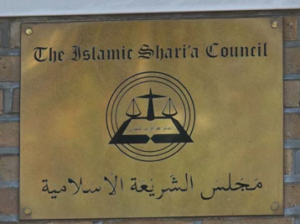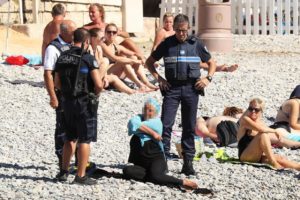
 A Court by Any Other Name: State ‘Courts’ and Sharīʿa Councils Southwest Asia/Pakistan editor Jeff Redding compares ongoing debates in Britain about the use of Islamic law in courts with those in India, based on his own research on India’s dar ul qazas (so-called sharīʿa courts). In Vishwa Lochan Madan v. Union of India, the Supreme Court of India threatened to dismantle the dar ul qazas in a controversy about whether these forums for dispute resolution, which were not state-associated, count as courts. In that sense, Redding suggests that the controversy became a “nomenclature debate” that should be about more than just words. For Redding, these courts, state-associated or not, function by following some formalized proceedings. On that view, he proposes shifting the debate from one about semantics or definitions to focus on “what we want to see in a proceeding, rather than whether it is a ‘court’ proceeding per se.” Read more. Image credit: Glenn Harvey/The Sun
A Court by Any Other Name: State ‘Courts’ and Sharīʿa Councils Southwest Asia/Pakistan editor Jeff Redding compares ongoing debates in Britain about the use of Islamic law in courts with those in India, based on his own research on India’s dar ul qazas (so-called sharīʿa courts). In Vishwa Lochan Madan v. Union of India, the Supreme Court of India threatened to dismantle the dar ul qazas in a controversy about whether these forums for dispute resolution, which were not state-associated, count as courts. In that sense, Redding suggests that the controversy became a “nomenclature debate” that should be about more than just words. For Redding, these courts, state-associated or not, function by following some formalized proceedings. On that view, he proposes shifting the debate from one about semantics or definitions to focus on “what we want to see in a proceeding, rather than whether it is a ‘court’ proceeding per se.” Read more. Image credit: Glenn Harvey/The Sun
 CASE DOCUMENT: Vishwa Locan Madan v. Union of India (Supreme Court of India, 2005) A landmark case that began in 2005, Vishwa Lochan Madan v. Union of India brought to bear the legal status of dar ul qazas, or sharīʿa courts, in India. The Supreme Court of India issued a decision in 2014, stating that non-state sanction courts of Islamic law have “no legal sanctity” in India. Nonetheless, the constitutional entanglements with legal pluralism, secularism, and rule of law that this case illuminated for Indian courts will be occupying legal scholars for years and cases to come. Read more. Image Credit: Wikipedia
CASE DOCUMENT: Vishwa Locan Madan v. Union of India (Supreme Court of India, 2005) A landmark case that began in 2005, Vishwa Lochan Madan v. Union of India brought to bear the legal status of dar ul qazas, or sharīʿa courts, in India. The Supreme Court of India issued a decision in 2014, stating that non-state sanction courts of Islamic law have “no legal sanctity” in India. Nonetheless, the constitutional entanglements with legal pluralism, secularism, and rule of law that this case illuminated for Indian courts will be occupying legal scholars for years and cases to come. Read more. Image Credit: Wikipedia
 Islamic Law and Policy: A Brief History of the French Burkini Ban UK/Europe/Southeast Asia editor Rachel Mazzarella chronicles the history of the French burkini ban in the context of French-style secularism, laïcité. She explores the extent to which this system permits or constrains accommodations of Islamic law and practice against the recent history of similar cases. The last ten years saw a litany of French bans on religiously-affiliated attire, which subordinate Muslim individuals’ conceptions of ‘awra (privacy, which is closely related to rules for modesty) to a government-informed definition of social integration. Read more. Image credit: Vantage
Islamic Law and Policy: A Brief History of the French Burkini Ban UK/Europe/Southeast Asia editor Rachel Mazzarella chronicles the history of the French burkini ban in the context of French-style secularism, laïcité. She explores the extent to which this system permits or constrains accommodations of Islamic law and practice against the recent history of similar cases. The last ten years saw a litany of French bans on religiously-affiliated attire, which subordinate Muslim individuals’ conceptions of ‘awra (privacy, which is closely related to rules for modesty) to a government-informed definition of social integration. Read more. Image credit: Vantage
See the full newsletter.

